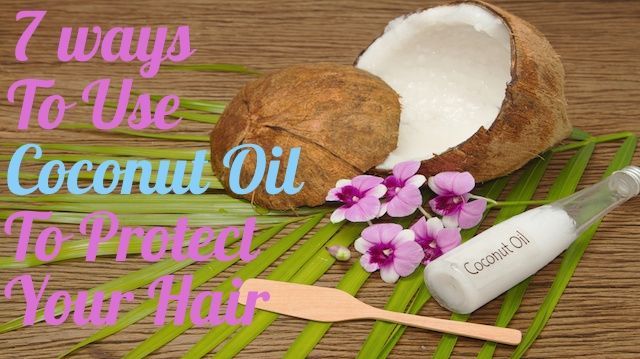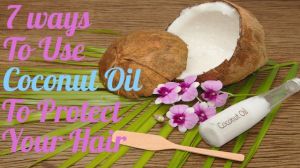
As the weather gets warmer, everyone gets excited about spending more time outdoors. But summer can bring many hair challenges. Depending on your hair type, you might find your hair is limp, frizzy, or difficult to control. If your hair is dyed, you might find that the sun or chlorine from swimming pools ruins the look of your color. Summer conditions such as wind, salt water and humidity can make it tough to keep hair looking good.
Luckily, one of our all-time favorite healthy foods and natural remedies is here to help: coconut oil! Whatever your hair hassle, coconut oil can probably help.
Coconut oil has so many amazing properties. It is a nourishing clean-burning fuel for stable energy and supports healthy cholesterol levels. This often helps people lose weight in a healthy way. Coconut oil also helps the thyroid gland function properly, and promotes immune system health.
How can this one oil have so many benefits? Scientific analysis has shown that the unique blend of fatty acids in coconut oil is synergistic with many body systems. Lauric acid is one of the main constituents, which is converted to monolaurin when we ingest it.
Monolaurin has antiviral and antibacterial properties, which discourage the growth of harmful bacteria but allow good bacteria to thrive. Along with capric acid, which is another fatty acid from coconut oil, monolaurin promotes a balanced microbiome both inside and outside of the body.
Recent scientific advancements have revealed how important bacteria are for health, whether it be for immunity, digestion or mood! So it’s no great surprise that a food like coconut oil can be so supportive of balance and well-being.
We are familiar with the many ways that coconut oil is super nutritious when we consume it internally, but did you know that it also has many external benefits? We can take advantage of coconut oil as a beauty treatment for our hair and scalp, especially in challenging summer conditions that can wreak havoc on every hair type.
A scientific study compared the efficacy of three different oils for treating hair: mineral oil, sunflower oil and coconut oil. They found that mineral oil and sunflower oil, which are commonly used in commercial hair products, don’t offer the greatest benefit for hair.
Mineral oil is a hydrocarbon or petroleum product and has no molecular affinity to the proteins in hair. This means it cannot chemically interact with or penetrate the hair follicle, so it doesn’t enrich the hair.
Sunflower oil, although it is a natural product, isn’t great either. It is a triglyceride of linoleic acid, which means that it has many double bonds. This results in a large molecule that cannot penetrate the hair strand. The researchers found that both of these oils did not prevent proteins being lost from the hair when it is washed.
Coconut oil, on the other hand, showed excellent results in this test. It has a high molecular affinity for hair proteins with a low molecular weight and straight chain structure. This means that the coconut oil fatty acids are able to enter the hair shaft and provide a nourishing and protective effect.
Many bloggers and natural beauty experts have shared stories of their hair becoming stronger and shinier after consuming and applying coconut oil. Let’s examine some specific treatments you can use depending on your particular hair needs this summer.
Sun damage
One of coconut oil’s impressive talents is the ability to protect hair and skin from the sun. Some experts say that coconut oil naturally contains a sun protection factor, or SPF 10. Coconut oil has been used as a natural sunscreen for many generations by indigenous pacific islanders. This is a great way to avoid sun protection products, which can contain toxic fragrances, endocrine disruptors and penetration enhancers.
Sun protection sprays for hair can be very expensive, and are a great example of an effective marketing ploy. We recommend using coconut oil instead. Just smooth a small amount over your hair and brush it through evenly. Be sure to include your scalp, especially if your hair is parted. Coconut oil can provide sun protection for your scalp too, which is often forgotten and is susceptible to sunburn.
You should note that coconut oil is a gentle form of sun protection, and likely won’t be effective if you have fair or sensitive skin, or are spending a lot of time in the sun. Use your own discretion to ensure you’re safe in the sun.
Chlorine damage
Both spending time in the sun and chlorine from swimming pools can cause unexpected changes in the color of your hair. Naturally lighter hair colors can turn green as a result of chlorine, and colored hair can fade or take on a different tint.
You can help prevent this effect by treating your hair with coconut oil prior to entering the pool. Simply wet your hair with regular shower water first, to open the hair follicle. Then smooth a spoonful of coconut oil over the hair and ensure the whole strand and scalp are coated. Since coconut oil is hydrophobic, the chlorinated water will be repelled once you enter the pool. You may need to shampoo the excess oil out once you’re finished swimming.
Note that coconut oil may not be the best choice for hair that is colored red; it may result in fading. Other hair colors should not experience this effect.
Salt water damage
Swimming in the sea can result in dry, frazzled hair. You can use the same pre-swim treatment recommended to prevent chlorine damage. This will help your hair stay moisturized and shiny, so you can avoid that matted post-beach look.
Wind damage
Whether you’re playing sports, walking on the beach, or driving with the top down, summer activities involve a lot of wind. This can really do a number on your hair. We recommend using coconut oil as a daily detangler to help reduce the damage caused by wind exposure.
Use this detangling treatment prior to brushing or styling your hair. Simply rub a small amount of coconut oil into your palms and work it gently through your hair. If you have thick, curly or long hair, you will need more oil than those with short or fine hair. Start with a little oil and increase the quantity if needed. It is easier to add more oil than to remove it if it starts to look too oily. After applying the oil, let it soak in for a minute or two, then begin to work through the hair with a brush or comb. Not only will this treatment seal the cuticle to smooth the hair and reverse wind damage, it will prevent further tangling.
While using coconut oil as an addition to your hair care routine here and there will be a great help, you can also take full advantage of the benefits by making your own coconut oil products. Here are some great recipes for coconut oil-based shampoo, conditioner, and deep conditioning treatments that you can use to keep your hair looking great all summer long.
Coconut Oil Shampoo Recipe
Take your personal hair type into account when making this recipe. Those with fine hair may only need 1/4 cup of coconut oil, whereas people with thick or dry hair might want to augment the coconut oil with some avocado, almond or apricot kernel oil.
Ingredients:
· 1 cup liquid castile soap
· 1/3 cup canned coconut milk
· 1/3 cup coconut oil
· 50–60 drops of favorite essential oils. Great essential oils for hair include lavender, wild orange, peppermint, lemongrass, rosemary, clary sage, and rosemary.
Instructions:
1. Melt coconut oil and coconut milk together over a very low heat, as to not damage any of the nutrients. Pour into a bottle with a secure lid, and top with the castile soap. Shake well. And then, shake some more. Add 50 drops of your favorite essential oils, and shake again.
2. This shampoo will not be as thick as commercial shampoos; squeeze on hair directly from the bottle. Wash, and rinse well.
Coconut Oil Conditioner Recipe
Here is a wonderful nourishing conditioner that uses coconut oil and other natural oils to promote healthy, shiny hair.
Ingredients:
· 2/3 cup coconut oil
· 1 tbsp vitamin E oil
· 1 tbsp jojoba oil
· 10 drops of your favorite essential oil
 Instructions:
Instructions:
1. Mix all ingredients in a bowl with a hand mixer until well combined. This may take several minutes. You want a smooth and creamy conditioner.
2. In the shower, after washing hair with coconut oil shampoo, use a teaspoon or two and smooth through hair.
3. Allow to penetrate hair for the remainder of your shower, and rinse very well.
Coconut Oil Deep Conditioning Treatment
Coconut oil works on the hair by reducing the loss of healthy proteins when the hair is washed. This is true when the oil is used either before washing or afterward as a grooming product, however the best results have been found when it is used as a deep conditioning treatment prior to washing.
This is because coconut oil, like any fat or oil, is hydrophobic, meaning it repels water. However the trick with coconut oil is the molecules are small enough and shaped in such a way that they are able to penetrate the hair shaft. Therefore, when the hair is wet and the cuticles open, the coconut oil molecules can enter and stay in the hair shaft, which builds in moisture and protection. The coconut oil also helps smooth the cuticle of the hair to prevent breakage and a frizzy texture.
This deep conditioning treatment helps repair split ends and adds healthy shine.
Ingredients and Equipment:
· Comb or hair pick
· Shower cap or small towel to wrap your hair in
· Two small bowls of different sizes (one should fit inside the other)
· Jar of organic virgin coconut oil
· Optional: essential oils such as geranium, lavender, cedarwood or rosemary
Instructions:
1. Scoop a small amount of coconut oil into the smaller of the two bowls.
2. Set the smaller bowl in the bottom of the larger one.
3. Fill the larger bowl with hot water so the smaller bowl is partially submerged, but not floating or taking on water.
4. Once the coconut oil comes to room temperature and is completely melted, mix in your essential oils (if using). Then use your fingers to gently massage the oil into your hair, then work through with a comb or hair pick.
5. After applying the oil, wrap hair up in a shower cap or small towel and allow it to soak in for thirty minutes or longer.
6. Shampoo to remove excess oil. Remember some of the oil will be able to enter and remain in the hair shaft.
7. Optionally, you may reapply a small amount of coconut oil to the ends of your hair and/or work a small amount through all of your hair again — just enough to give it a healthy shine. Finally, style as usual.
Discover 9 Reasons Why You Should Eat Coconut Oil EVERY Day =>
-The Alternative Daily
Sources:
http://www.md-health.com/How-To-Use-Coconut-Oil-For-Hair.html
http://draxe.com/coconut-oil-for-hair
http://coconutoil.com/coconut-oil-hair-benefits-how-to-use-coconut-oil-for-natural-hair-health
http://cat.inist.fr/?aModele=afficheN&cpsidt=14829183
http://cat.inist.fr/?aModele=afficheN&cpsidt=1437172
http://journal.scconline.org/pdf/cc2001/cc052n03/p00169-p00184.pdf

